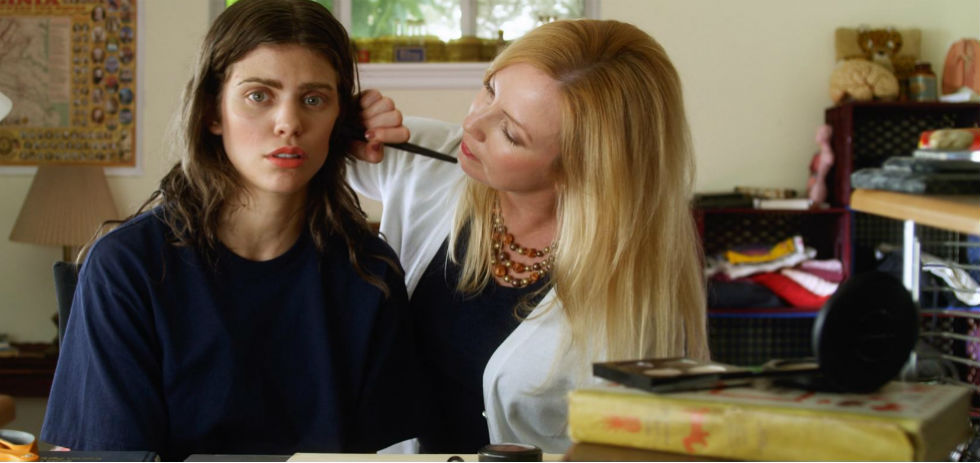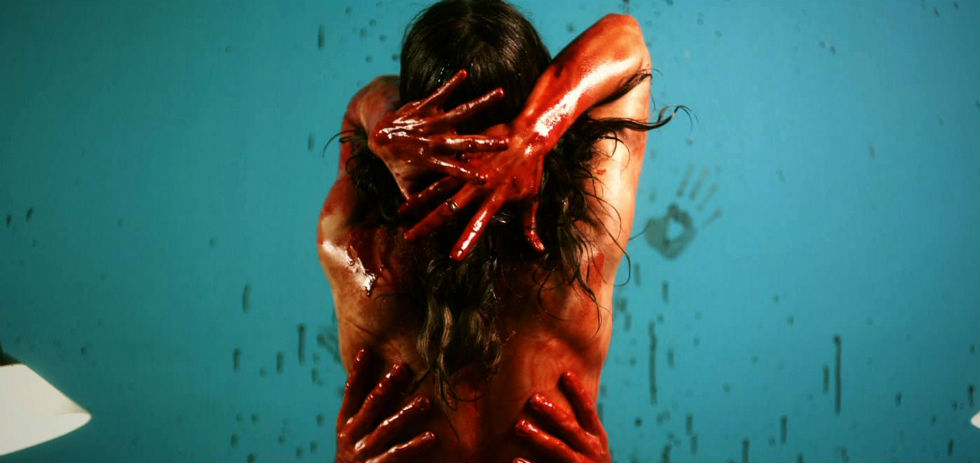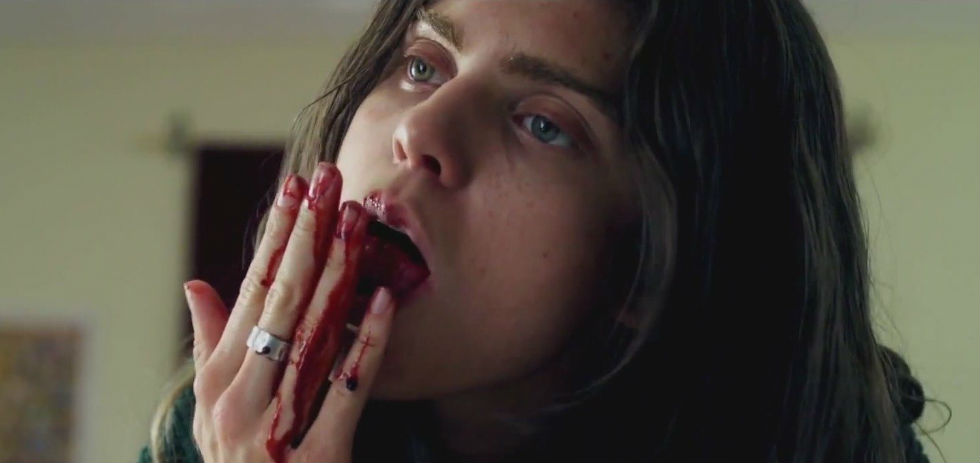You Have to See… is a weekly feature here at 4:3, where one staff writer picks a film they love and makes a group of other writers watch it for the first time. Once this group has seen the film, the suggestor writes a piece advocating the film and the others respond below. Whilst not explicitly spoiling the film, the article is detailed. We would recommend seeking out and watching the film each week, then joining in the debate in the comments section.
This week Felix Hubble looks at Richard Bates Jr.’s impressive and off-colour debut, Excision (2012).
I first saw Excision at the 2012 Sydney Film Festival, purchasing a ticket off the back of the film’s feature image in the program, and the knowledge of its inclusion in SFF’s Freak Me Out stream (the festival’s horror selection) alone. Having not read the synopsis I had no idea what to expect and no inkling of the fact that I was about to experience something so fiercely up my alley that it would become my favourite film of that year, one that I would adore on rewatch after rewatch. Also previously unbeknownst to me was the attendance of director Ricky Bates Jr. at the screening, showing an enthusiasm, vibrancy and youthful (see: drunken) vigour desperately needed in the modern horror scene if it is to break from the shackles of tired genre tropes and generic rehashing of past content, fully embracing the 21st century benefits of affordable camera gear and consumer technologies capable of feature film post-production. These tools could potentially see a burst of original and exciting content coming out of the new generation of genre film directors, however, they are often used to trounce out cheaper versions of the same formulaic flicks that form the ever-crumbling backbone of the horror genre instead, or to create lower-budget rip-offs of the same trash the mid-to-major studios thrust upon us every year (more rape-revenge flicks, another lo-fi Saw rip-off, generic haunted house fare). Of course, this sort of content has a place within the horror genre, but it is rare to find a flick that pushes so brazenly into new territory when approval is granted from the masses for just referencing past content or being generally edgy, and Richard Bates Jr’s Excision does just that in this (arguably) scare-less coming-of-age tale, framed through the lens of horror.
Excision is the tale of a mentally unhinged high-school student attempting to craft out their own place in the world. The film is a subversion of traditional coming-of-age narratives, casting focus away from the wholesome Catholic girl gone wild, or the popular chick who has to come to terms with internal conflicts, or the ditzy, nerdy (but somehow, always extremely attractive) girl who finds her place in high school, and instead focusing on the creepy kid, the social outcast with no chance of redemption by the end of the film – the other. It is, however, extremely important to note that Excision never falls into the realm of straight out parody or satire – Scary Movie this ain’t; there are no ‘gags’ or ‘bits’ that directly reference traditional mainstream coming-of-age flicks, Excision is its own beast.
The film follows Pauline, a high-schooler preoccupied with delusions of eventually entering the professional medical world despite poor-grades and a total lack of interpersonal skills (not because she’s dumb, because she truly doesn’t care – she is a total badass). She ditches class to study anatomy, practising surgery on herself and injured baby animals. Her overbearing and generally nasty mother obsesses over crafting her into her into the perfect girl (any of the above teen movie archetypes will do) to the point of assault, out of everybody around her, she is only able to relate to her sister, who is slowly dying of cystic fibrosis, and her father (who obviously loves her) so dearly wants to avoid confrontation with his wife that he has clearly distanced himself from his own daughter. Pauline is vile, antagonistic, and generally gross, and yet, we somehow find ourselves rooting for her, she is the true underdog, a real outcast (not because of rejection, by choice), and a sort-of horror-ified “manic pixie dream girl” – but without any of the negative connotations generally associated with the label. She represents our desires; she fully embraces her own sexuality and kinks, she says exactly what’s on her mind in the face of social convention, she doesn’t need the validation of her schooling peers to feel comfortable as an individual. Bates Jr. does an amazing job of humanising this clearly out-there character, giving weight to her emotional journey, and making the whole absurd tale, dare I say it, relatable. It also helps that this is one of the few times that horror has dealt with mental illness and disability respectfully – in fact, Bates Jr. actually casts a deaf person to play a deaf character, and people’s ignorance, not their disability is the butt of the joke. These are two areas that horror, a genre largely predicated on stigmatising mental illness so it can develop murderous psychopaths, is notorious for trainwrecking in its approach – in fact, horror has probably done more on a whole to stigmatise mental illness alone than any other genre, and it was super refreshing to see Richard Bates Jr. rise above this.
One thing that really stuck with me during Bates Jr’s post-film Q&A was a statement he made to the effect of: “I wanted to make the sort of film I would love and rewatch over and over again if I was teenage me and I had just discovered this in a video store.” This is exactly the sort of film I needed to see at that point in time; it was a wake-up call, a reminder that not all horror was the Final Destination series, that I didn’t need to watch every supernatural horror flick (see: The Eye, The Grudge, The Skeleton Key etc.) the studios pushed out every year – even though there was nothing wrong with enjoying them – and that there was an expansive and varied world of horror out there. If it wasn’t for my first Excision experience I probably wouldn’t have dug deeper into the genre and checked out films like Frankenhooker or The Re-Animator, or taken a risk on more modern favourites like American Mary or The House of the Devil. For me Excision was the film I had just stumbled across as a teenager and rewatched into oblivion; although slightly distanced from its protagonist, I felt at home in its weird and twisted world. Everything about it just clicked with me, from the incredible cast of my past celluloid loves (Traci Lords of Cry Baby and Zack and Miri Make a Porno, Roger Bart from Hostel: Part II, cult actors Malcolm McDowell and Ray Wise, the loveable John Waters and, of course, AnnaLynne McCord from my favourite, Nip/Tuck) who all turned in fantastic performances, to Bates Jr’s incredible framing in thirds, not to mention its brief, easily digestable and punchy 81 minute runtime, everything about Excision had me hooked and wanting more. That’s not to say that I don’t have my issues with it (which films can you honestly say are 100% flawless?) – the nightmarish (and particularly sky-blue) dream sequences, for instance, although creepy, demented, and generally cool don’t always work for me – but in spite of this, it’s one of the few movies out there that I’d class as almost perfect to me in spite of their flaws.
I also really admire what Bates Jr. managed to do with an (occasionally) obviously limited budget. He never overreaches, working within his financial constraints, and substitutes impressive aesthetic awareness and pre-planning for high-cost, post-production fixes. Bates Jr. put a lot of time and effort into creating aesthetically pleasing shots that are often almost symmetrical and all focus on different singular colours (neon purple, swimming-pool blue). The level of attention to detail is unparalleled in comparison to other similarly budgeted films with great time put into set-dressing and creating intriguing compositions that draw the viewers eye around the frame. Bates also ditches more traditional quadrant forms of framing, instead splitting his canvas into vertical thirds, with characters often appearing centre of frame. This took a while to identify the first time I saw the film, but it was something that immediately grabbed my attention and piqued my interest; it was clear that something out of the ordinary was going on with the visual elements of the film, a practise he has continued in his more recent outing Suburban Gothic.
The beauty of my first experience of Excision was the element of surprise. I hadn’t scoped this out on Bloody Disgusting or any other similar horror blogs, I was yet to be immersed into the weird and wonderful world of Letterboxd and the film Twittersphere, I had even avoided the synopsis provided in the Mecca of festival film knowledge that is Sydney Film Festival’s program guide. Sure, I was probably going to enjoy it given the fact that it was a horror film, and worthy of Richard Kuiper’s final six selections for the year, but everything in the film was a total surprise to me. I didn’t know I’d see so many familiar faces, I didn’t come in with any preconception of the surgical subplot, there was nothing to tip me off about the direction that the film was going in before I entered the auditorium, and nothing to guide my viewing experience towards clues hinting at the film’s eventual outcome apart from what was on screen. Everything about the experience felt new and fresh, a true journey of discovery echoing the traditional coming-of-age film path of self-discovery.
Excision isn’t going to be a film for everyone, this isn’t the sort of thing you can just give to any friend and expect them to enjoy. However, for the select crew of people who are into the genre, Excision is that much needed breath of fresh air to reignite the youthful joy of discovering something new in familiar territory. There’s probably enough here to garner the seal of approval from even the casual horror viewer and convert some of the more on-the-fence horror-hounds out there into a life of sifting through semi-obscure indie spookfests searching for the little nuggets of gold out there. I hope that a larger studio eventually backs Bates Jr. on some bigger projects, between this and Suburban Gothic, he’s developed a really nice personal style and it would be great to see him pizzazz up some of their more cynical scarefests to make them much more unique, interesting, and bearable. Bates Jr. is an extremely important director in the modern horror landscape and I can’t wait to see what he comes up with next. He is fighting the good fight within the horror community right now, and hopefully he will be victorious.
Dominic Barlow: What struck me about Excision‘s aesthetic wasn’t so much the framing that Felix lauds but its lighting. Any other film might wind up with the same flat scheme out of half-consideration but it has an interesting effect on interiors here. Pauline’s home becomes a surgery, highlighting all the unsightly flaws for her to try her medical delusions on, and everywhere else is its waiting room, caked in sterility and begging to be carved through. The music is also outstanding, especially in the way it varies between fitting adolescent hymns from indie musicians (Nina Nastasia, The Pacific Ocean) and the unsettling yet hypnotic electronic score by Steve Damstra II (Cheap Thrills) & Mads Heldtberg (The ABCs of Death 2, You’re Next). Whether they’ll manifest in real life or gore-laden dreams is never a sure thing, and the film has a fair number of other strange surprises like that. The story isn’t so bad, either. While I always enjoy hearing movie fans recount their first viewing of a favourite film, I especially like the Q&A quote Felix has provided in his, because it helps me make sense of its surfeit of tonal and thematic influences. Over 80 minutes, the narrative flits between high school peer pressure, religious collar-tugging, family drama, treatment of the terminally ill and female sexual maturation. It’s a heady mix that surely a few teenagers have fallen in cultish love with, along with the Wednesday Addams-like ingenue at the centre, played superlatively by McCord. It might not overreach in its visual touches, as Felix rightly asserts, but it does for affection in its writing, particularly in its naked critiques of organised religion and outlandish dream sequences (tumble-dried foetus, anyone?). Still, it sinks back into comfortable rhythms often enough to justify faith in its director like the faith Felix demonstrates. I’ll be sure to check out Suburban Gothic at the next opportunity.
Lyndsey Geer: I watched Excision with two friends, one who strongly recommended the film and another, not known to be a horror fan, who constantly remarked, “When is this going to get scary?” throughout the entire film. Excision was described to me as a coming-of-age horror flick, and while I am no expert when it comes to the horror genre, I am a huge fan of coming-of-age flicks and, honestly, there are few things scarier than being a teenage girl. AnnaLynne McCord is incredible as Pauline, especially as someone who strays from the traditional female character depicted in coming-of-age tales. Although she does believe she needs psychological help she fully embraces her desires, sexual or otherwise and doesn’t seeks the validation of the peers around her; I can imagine myself being quite empowered by Pauline’s character if I had the chance to watch Excision when I was a teenager. One of the things that Bates Jr. does so well with Excision is give you the ability to empathise with Pauline and she isn’t exactly the most likeable character. I believe this is achieved proficiently through the depiction of Pauline’s familial relationships; there are a number of tender moments between Pauline and her sick younger sister, and despite her tough exterior there are moments when Pauline is very visibly upset about the nasty things her mother says to her. While I was able to predict how the film would end halfway through, Bates Jr. was able to establish a tone with Excision that still had me on the edge of my seat, making the final scene with Pauline and her mother embracing and screaming in anguish one of the more difficult scenes to watch (and this had nothing to do with the blood).
Saro Lusty-Cavallari: Let me preface this by saying that I’m pretty partial to horror and rarely have trouble with excessive amounts of gore, in fact I can even appreciate a bit of gore for gore’s sake. But weirdly enough my biggest impression after finishing the largely successful Excision was that perhaps Bates Jr. should have pulled back a bit from really making a genre film. While they carry a small amount of expositional duty, the bloody dream sequences, although largely impressive in their own right, keep pushing the viewer back into the mindset that all hell will break loose. Yet I find the films very gradual accumulation of slightly off-colour body horror so much more effective and unnerving. Imagine if Pauline’s fetish had slowly been revealed to us through her behaviour, relying on an increasingly undeniable subtext instead of a pretty heavy-handed piece of signposting. So much is sunk into the methodical pacing of the “real world” that being pulled back into the restlessly edited violence of Pauline’s dreams actually served as an unneeded relief. That final sequence is so devastatingly effective in terms of its violence and its emotional impact that I can only imagine how truly disturbing and affecting Excision would have been had it taken Takashi Miike’s Audition approach and pretty much held back until the very end. Nevertheless the film as it stands is far from lacking power, a sympathetic and emotionally astute horror film that pulls no punches whatsoever.


